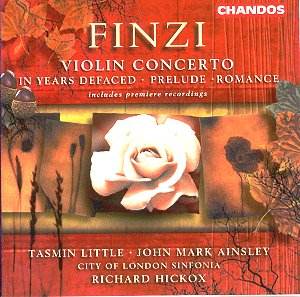Gerald
FINZI (1901-1956)
In Years Defaced (six songs for voice and orchestra)
Prelude for string orchestra
Romance for string orchestra
Violin Concerto
 John Mark Ainsley (ten)
John Mark Ainsley (ten)
Tasmin Little (violin)
City of London Sinfonia/Richard Hickox
world premiere recordings of the concerto and five of the six songs
2 Dec 1999, 30 May 2000, Watford Colosseum
 CHANDOS CHAN 9888
[54.34]
CHANDOS CHAN 9888
[54.34]
Crotchet
Amazon
UK
Amazon
US

It had to happen. One of these days someone was going to go back to the family
archives and revive the Finzi Violin Concerto. It was premiered in the 1920s
under Sargent and was withdrawn by the composer with only the totally
characteristic Introit (middle movement) surviving. The Introit
is known from the Boult LP Lyrita recording (never reissued - now there's
a surprise!) where the soloist was Rodney Friend. Friend has a tighter tone
production without the light vibrato used by Tasmin Little. However we may
as well be talking about a completely new work here for the quick and fanciful
outer movements are astonishingly neo-classical touched with Stravinsky's
Pulcinella and the iconoclastic Bliss of Conversations. The
work would pair neatly with Vaughan Williams Concerto Academico and
further North Lars Erik Larsson's Violin Concerto.
The Six Songs are orchestrated as follows To a Poet (from O Fair
to See) by Colin Matthews; When I Set Out for Lyonesse (Finzi
original); In Years Defaced by Jeremy Dale Roberts; Tall Nettles
by Christian Alexander; At a Lunar Eclipse by Judith Weir; Proud
Songsters by Anthony Payne. The songs stand up well to this processing.
It is only a pity that all were not orchestrated by the composer himself
or by Howard Ferguson. Ferguson's work on orchestrating the Interlude (original
for oboe and string quartet) was well night seamless with Finzi's natural
mode of 'speech'. As it is all the composers show great skill and sensitivity.
The first three songs listed sound authentically Finzian (no surprise in
the case of Lyonesse) but the others, while naturally preserving the
vocal and lyric line, use touches which are outside the Finzian range. At
a Lunar Eclipse carries strong hallmarks of Vaughan Williams. That some
of these pieces do not sound like the Finzi we have received down the years
since 1975 is no condemnation. There is no suggestion that the composers
were enjoined to create a Finzian sound. What we have instead is a celebration
that will give these songs some new life.
The Prelude and Romance are predictable, though typically gentle and touching,
disc-mates; just as nicely done as on the Nimbus/William Boughton versions
(differently coupled of course).
This is a very fine disc (if short on playing time). I presume that
reconstructions of Finzi's 'symphony' and 'piano concerto' (from which we
known the Eclogue and the Grand Fantasia and Toccata) are impending during
this centenary year. Long may this process continue although Finzi lovers
may find the Violin Concerto's outer movements something of a jolt out of
Finzi's accustomed track.
Rob Barnett

